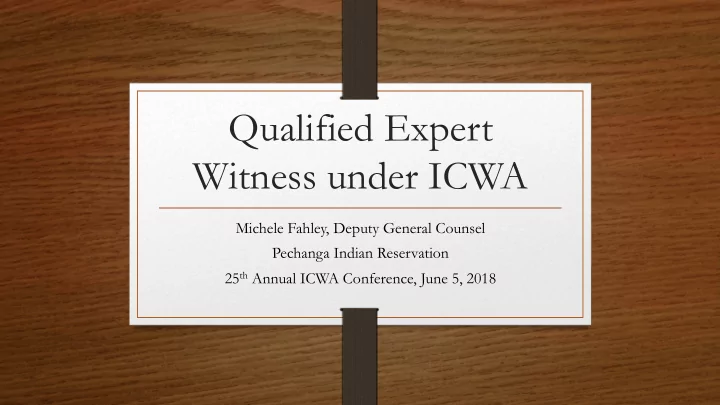

Qualified Expert Witness under ICWA Michele Fahley, Deputy General Counsel Pechanga Indian Reservation 25 th Annual ICWA Conference, June 5, 2018
ICWA and the Qualified Expert Witness • Foster Care Placement (25 U.S.C. §1912(e); Welf. & Inst. Code §224.6): • No foster care placement may be ordered in such proceeding in the absence of a determination: • Supported by clear and convincing evidence , • Including testimony of a qualified expert witness, • That the continued custody of the child by the parent or Indian custodian is likely to result in serious emotional or physical damage to the child.
ICWA and the Qualified Expert Witness • Termination of Parental Rights (25 U.S.C. §1912(f); Welf. & Inst. 361.7(c)): • No termination of parental rights may be ordered in such proceeding in the absence of a determination: • Supported by evidence beyond a reasonable doubt , • Including testimony of a qualified expert witness, • That the continued custody of the child by the parent or Indian custodian is likely to result in serious emotional or physical damage to the child.
Child-Custody Proceedings and the QEW • The new BIA Regulations (25 C.F.R. §23.2) definition of a child custody proceeding provides that, “an action that may culminate in one of four outcomes [foster care, termination of parental rights, pre-adoptive placement, and adoptive placement] is considered a separate child-custody proceeding from an action that may culminate in a different one of these four outcomes. There may be several child-custody proceedings involving a given Indian child. Within each child-custody proceeding, there may be several hearings.”
Timing of the Expert • Under the new regulations, if there is reason to know the child IS an Indian child, the court must receive testimony from a qualified expert witness that continued custody by the child’s parent or Indian custodian is likely to result in serious emotional or physical damage to the child. • Detention/Jurisdiction Hearing • Emergency proceedings should not be continued for more than 30 days, unless (25 C.F.R. §23.113): • The court finds that restoring the child to the parent or Indian Custodian would subject the child to imminent physical damage or harm; • The court has been unable to transfer the proceedings to the jurisdiction of the Tribe; or • It has not been possible to initiate a “child-custody proceeding.” • Disposition Hearing • Termination of Parental Rights Hearing
Burden of Producing Expert • The expert requirement applies when the court seeks to place a child in foster care or terminate parental rights • In dependency cases, the burden to produce an expert lies with the County • Welf. & Inst. §224.6 provides that the court “may” ask the tribe if they have an expert they wish to use. • BIA regulations state that the court or any party may request the assistance of the tribe in locating persons qualified to serve as expert witnesses. (25 C.F.R. §23.122(b)) • The County usually requests that a declaration be provided by the expert • California law requires that all parties agree in writing to accept the declaration in lieu of oral testimony (Welf. & Inst. Code §224.6(d))
Who Qualifies as an Expert? • According to Welf. & Inst. §224.6, experts under ICWA include: • [P]ersons with the following characteristics are most likely to meet the requirements for a qualified expert witness for purposes of Indian child custody proceedings: • (i) A member of the Indian child's tribe who is recognized by the tribal community as knowledgeable in tribal customs as they pertain to family or organization in childrearing practices. • (ii) A lay expert witness having substantial experience in the delivery of child and family services to Indians and an extensive knowledge of prevailing social and cultural standards and childrearing practices within the Indian child's tribe. • (iii) A professional having substantial education and experience in the area of his or her specialty. • The BIA Regulations (25 C.F.R. §23.122) state that the social worker assigned to the child may not serve as the QEW, and Welf. & Inst. Code §224.6(a) states that “no employee of the…agency pursuing or recommending foster care placement or termination of parental rights” may serve as an expert witness.
Role of the Expert • To provide the testimony required regarding “whether continued custody by the parent(s) will result in the likelihood of serious emotional or physical harm to the child.” • Experts are supposed to testify to the “prevailing social and cultural standards of the Indian child’s tribe, including family organization and child-rearing practices.” • Evidence must show a “causal relationship” between particular conditions in the home and the likelihood that continued custody of the child will result in serious emotional or physical damage to the child (25 C.F.R. §23.121(c)). • Evidence that shows only the existence of community or family poverty, isolation, single parenthood, custodian age, crowded or inadequate housing, substance abuse, or non- conforming behavior does not by itself constitute sufficient evidence (25 C.F.R. §23.121(d)).
Turning Now to the Experts • Corrina Garbani Sanchez, Child and Family Services Manager, Pechanga Band of Luiseno Indians • Elizabeth Elgin-DeRouen, Advocate, Indian Child & Family Preservation Program • Interactive Role-Play with our Experts!
Recommend
More recommend